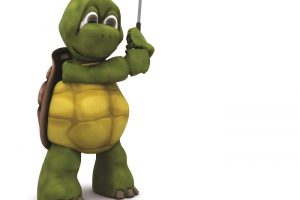When he gets interestedin something, which happens a lot, Guy Yocom goes deep. Given the way one of golf’s all-time interviewers has been wired—abundantly by nature, sparingly by nurture, dynamically in combination—it seems he’s had little choice.
Sixty years ago, when he was 9, Yocom began diving into the stacks of rejected old books his mother had brought home from her job at a community donation center.
“There was every subject you could think of, but I was drawn to the unusual—UFOs, circus freaks, astrology, palmistry, unsolved crimes,” says Yocom, leaning back in a West Haven, Conn., diner, clipping his well-chosen words with a deliberate cadence. “There were some racy novels and even some Playboys. That was OK with my mom. She always said, ‘All reading is good.’”
Such precocious literacy started Yocom on the path of an autodidact polymath. Leonardo da Vinci is the epitome of the cumbersome and often loosely applied designation, and though Yocom winces at the term and especially the da Vinci reference, he is not a Cliff Clavin. He doesn’t just talk the talk. Consider that his independent research in extreme weather, one of his many passions, is credited by aficionados with debunking a myth that a man who filmed the deadly 1953 Warner Robins tornado was killed.
So complete is Yocom’s immersion in his cornucopia of enthusiasms that over the decades he’s accumulated a collection of whimsically adjacent ephemera. In support of his extensive knowledge of World War II’s Pacific theater, Yocom owns a vial of volcanic black sand from a landing beach at Iwo Jima. His fascination with vintage clarinets was enriched by acquiring handwritten notes by a legendary master of the instrument, Artie Shaw. The magnificence of racing thoroughbreds giving their all led him to obtain a strand of hair from Secretariat’s mane. A JFK obsessive, he has preserved a sliver of wood from a picket fence that conspiracy theorists believe marked the spot where shots were fired on the grassy knoll.
“Great conversation starters,” says Yocom, whose delight in lively discussions always makes him the most reluctant party to let them end.
Of course, he’s most knowledgeable about the subject that’s given him an illustrious career. Still a Golf Digest contributor after his 36-year full-time tenure ended in 2020, Yocom has covered every area of the game with his body of work, from instruction to the rules to profiles to historical retrospectives. He’s also collaborated on books with Jackie Burke, Johnny Miller, Phil Mickelson, Corey Pavin and David Graham and helped ghostwrite Tiger Woods’How I Play Golf.
Yocom made his most enduring mark with My Shot, a collection of 125 intimate one-on-one interviews in which a who’s who (and the occasional who’s that) of golf allowed our benevolent provocateur to steer them toward the real and revealing. Running from 2002 to 2020, My Shot stands as the most successful long-term series in Golf Digest history and what Yocom calls the best he ever did.
By going deep—with intense preparation, curiosity and an instinct for the right question in the right tone at the right moment—Yocom elicited stories and reflections that produced wisdom, humor, regret, confession and idiosyncrasies.
For the length of the series, an equally immersed editor, Mike O’Malley, structured the sequence of answers as a bouncy, digressive monologue that kept the reader wanting more. The mix included punchy one-liners, like Billy Casper’s answer to what hippopotamus tastes like: “Not surprisingly, it’s very watery.” Or Boo Weekley’s incomplete recollection of being knocked out cold from the first punch thrown by a boxing orangutan: “I woke up bleeding in the back of a friend’s pickup truck.” Or JoAnne Carner’s conditional decision after the death of her husband never to marry again: “That will change when Sean Connery calls.”
From the greats, there were weighty insights. Said Jack Nicklaus, “There are more good players today. There were more great players in my day.” Mickey Wright’s loving description of a perfect 2-iron she hit in 1957 at age 22, followed by the haunting reflection that “I spent the rest of my career trying to duplicate the feel of that shot,” closes the book on golf’s innate elusiveness.
'I wanted our session to have the feeling of a last will and testament, a summation of what was true in their life.'
—Guy Yocom
Because most subjects had lived a lot of life, many of My Shot’s most powerful moments dealt with mortality. Hubert Green recounted how a nurse he had grown to hate for her gruffness held his hand and cried with him as he endured chemotherapy for throat cancer. Doug Sanders, in terrible pain from a neck condition but wanting to avoid the stigma of suicide, explained how he arranged his own contract killing (he called it off after successful corrective surgery). Larry Nelson recalled the terror he felt in Vietnam when a large group of enemy soldiers rustled through the jungle only a few yards away while the rest of his platoon was asleep. He knew that a comrade startled awake would mean annihilation.
The normally voluble Yocom was silently rapt at such moments, thrilled to let the fruits of his labor and skill spill forth. “These special golfers, I wanted to know what drove them from the inside,” he says. “Most of them had a hard shell to keep the world out and their feelings in, so the interview was often an exercise in getting underneath that. I wanted our session to have the feel of a last will and testament, a summation of what was true in their life.” No surprise that when a famous golfer dies, obituary writers lean hard on My Shot.
Yocom developed the interviewer’s skill for quick adaptation early in life. He was born and raised in Salt Lake City, where his birth parents married and divorced each other three times, his mother marrying another three times and his father twice more. Growing up, Yocom lived among constantly changing versions of blended families.
In response, Yocom became a “free-range kid. I was out of the house a lot, looking for something I guess I wasn’t getting there. As long as my mom knew where I was, I might stay at other kids’ houses three or four days at a time. Parents of my friends usually liked having me around. I was keeping their kids busy, I was respectful, and I could keep conversations going with some of the offbeat information I had picked up, which felt good.”
As a teenager, Yocom missed a year of high school because of a difficult relationship with a stepfather. Essentially on his own and needing money, he took on miserable jobs like packing eggs in a chicken-harvesting plant and keeping a sewage station tank called the Digester unclogged.
“I have an affinity for ragtag people who grew up like I did, and sometimes they for me,” he says. “I remember doing a My Shot with Hale Irwin, and as he was recounting his hardscrabble childhood in Baxter Springs, Kansas, he paused a moment, looked me right in the eye, and said, ‘You know what I’m talking about, don’t you?’”
But Yocom’s path also had early positives. He fondly remembers preschool years when his mother, Leona, taught him phonics and soon had him reading pages along with her. “I was blessed with a great memory. Whatever I would read would stay with me,” he says. “Stories, made up or factual, would really affect me, and they always have.”
HIS SHOT: From humble beginnings, Yocom rose to interview golf’s greats. Photograph by Dom Furore
MORE: Guy Yocom on the real Payne Stewart
Yocom’s fortunes changed after high school when he got a job as a greenkeeper at Rose Park Golf Course, a gritty muny near his house. He had first gone there only to find lost balls to sell to the pro shop, but the new job enabled him to try golf for free.
It wasn’t long before the former Little League shortstop was breaking 80. His frequent playing partner was the son of the pro, Robbie Potter, who was preparing to enter Weber State. He wanted Guy to join him and urged Yocom’s father, Bob, a truck driver and part-time boxing judge, to cover the $162-per-quarter tuition. “Robbie said, ‘Please, Mr. Yocom, you have to let Guy go to Weber with me. He’s way smarter than the rest of us,’” Yocom recalls. “I think because my dad liked that Robbie was a clean-cut kid, he said yes. I became the first person in my immediate family to attend college, and my world opened.”
Yocom majored in journalism, joined the school paper and eventually became the sports editor with a tuition waiver. Upon graduation he was hired full-time at the Ogden Standard-Examiner, where golf became his favorite beat.
When he called about a job at Golf Digest, he was told there were no openings but to keep trying. “I became a very squeaky wheel and finally one day they said yes.” His first day at the offices in Norwalk, Conn., was June 8, 1984. “A week later I was at the U.S. Open at Winged Foot with a media credential. Golf had become my yellow brick road.”
Not that he didn’t suffer some culture shock. “I was around all these East Coast English majors and felt so unprepared,” he says, “but gradually I realized how my background gave me some advantages.”
Yocom’s eye for the unusual and ease with people soon had him regaling coworkers with stories from his road assignments. Also included were verbatim reenactments of George C. Scott’s five-minute opening address to the troops in “Patton” or rollicking paragraphs from P.G. Wodehouse’s short story “Chester Forgets Himself.” At major championships, Yocom would humor writing heroes like Dan Jenkins, Tom Callahan and George Plimpton with his favorite passages from their work.
Yocom also impressed with his work, especially with an in-depth oral history on the 20th anniversary of the 1975 Masters. When he suggested adapting the approach of Esquire magazine’s “What I’ve Learned” column to golf, the editors were confident Yocom would come back with something special and allowed him to choose his subjects.
The first My Shot was with Sam Snead, four months before his death at age 89. Gone was any sadness at what Snead fell short of accomplishing, replaced by a peace reflected in his explanation of how in his later years he could put deer and other wild creatures he encountered in the woods at ease. “All I do is look at them softly and move in a slow, kind way,” said golf’s Nature Boy.
Yocom’s sessions with other greats often created a bond, leading to treasured esoterica: beautifully handwritten notes from Mickey Wright, a Wilson 8802 putter from Lee Trevino and a finely textured aluminum Swiss Army knife that Jackie Burke had nonchalantly put in his palm as a keepsake. Conversely, Yocom gifted Mickelson mercury dimes from his coin collection, which Phil used as ball markers while winning the 2006 Masters. From Moe Norman, who could hit one identical straight shot after another better than any golfer who ever lived, Yocom has several worn photos of Norman swinging that the shy and possibly autistic Canadian had carried in his wallet.
"I guess Moe was my favorite My Shot,” Yocom says. “He was so guarded but had so much inside. It was a delicate process to get him to feel comfortable enough to trust me. I did little things like sit close to him and let our arms touch. I’d speak calmly, making eye contact, which was hard for Moe. When he opened up, that was thrilling.
“You know, people want to be understood, especially if they’ve been outliers and felt misunderstood and they want to better understand themselves. That was a big part of the willingness to do the My Shots, and my role was to help that happen. The more time goes by, the more grateful I am that I got that chance.”
So are we.
Some Guy Yocom Classics News The subtle ingredients of the best golf clubs
Golf Digest Logo My Shot: Keeping Up With The Mickelsons
Why is this man smiling?
The article "The Best I Ever Did: How writer Guy Yocom mastered the golf interview" was originally published on https://sports.yahoo.com/article/best-ever-did-writer-guy-140044575.html




